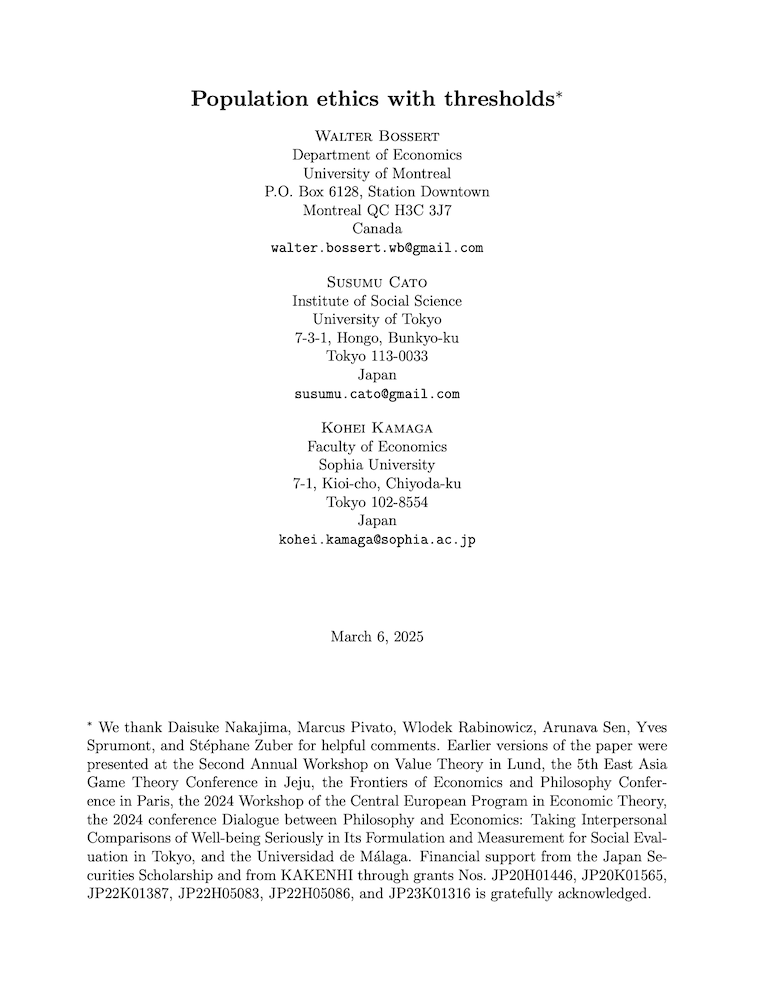Population ethics with thresholds
Walter Bossert (University of Montreal), Susumu Cato (University of Tokyo) and Kohei Kamaga (Sophia University)
GPI Working Paper No. 3-2025
We propose a new class of social quasi-orderings in a variable-population setting. In order to declare one utility distribution at least as good as another, the critical-level utilitarian value of the former must reach or surpass the value of the latter. For each possible absolute value of the difference between the population sizes of two distributions to be compared, we specify a non-negative threshold level and a threshold inequality. This inequality indicates whether the corresponding threshold level must be reached or surpassed in the requisite comparison. All of these threshold critical-level utilitarian quasi-orderings perform same-number comparisons by means of the utilitarian criterion. In addition to this entire class of quasi-orderings, we axiomatize two important subclasses. The members of the first subclass are associated with proportional threshold functions, and the well-known critical-band utilitarian quasi-orderings are included in this subclass. The quasi-orderings in the second subclass employ constant threshold functions; the members of this second class have, to the best of our knowledge, not been examined so far. Furthermore, we characterize the members of our class that (i) avoid the repugnant conclusion; (ii) avoid the sadistic conclusions; and (iii) respect the mere-addition principle.
Other working papers
Do not go gentle: why the Asymmetry does not support anti-natalism – Andreas Mogensen (Global Priorities Institute, Oxford University)
According to the Asymmetry, adding lives that are not worth living to the population makes the outcome pro tanto worse, but adding lives that are well worth living to the population does not make the outcome pro tanto better. It has been argued that the Asymmetry entails the desirability of human extinction. However, this argument rests on a misunderstanding of the kind of neutrality attributed to the addition of lives worth living by the Asymmetry. A similar misunderstanding is shown to underlie Benatar’s case for anti-natalism.
A Fission Problem for Person-Affecting Views – Elliott Thornley (Global Priorities Institute, University of Oxford)
On person-affecting views in population ethics, the moral import of a person’s welfare depends on that person’s temporal or modal status. These views typically imply that – all else equal – we’re never required to create extra people, or to act in ways that increase the probability of extra people coming into existence. In this paper, I use Parfit-style fission cases to construct a dilemma for person-affecting views: either they forfeit their seeming-advantages and face fission analogues…
The long-run relationship between per capita incomes and population size – Maya Eden (University of Zurich) and Kevin Kuruc (Population Wellbeing Initiative, University of Texas at Austin)
The relationship between the human population size and per capita incomes has long been debated. Two competing forces feature prominently in these discussions. On the one hand, a larger population means that limited natural resources must be shared among more people. On the other hand, more people means more innovation and faster technological progress, other things equal. We study a model that features both of these channels. A calibration suggests that, in the long run, (marginal) increases in population would…

